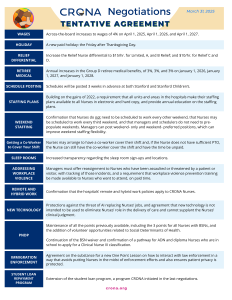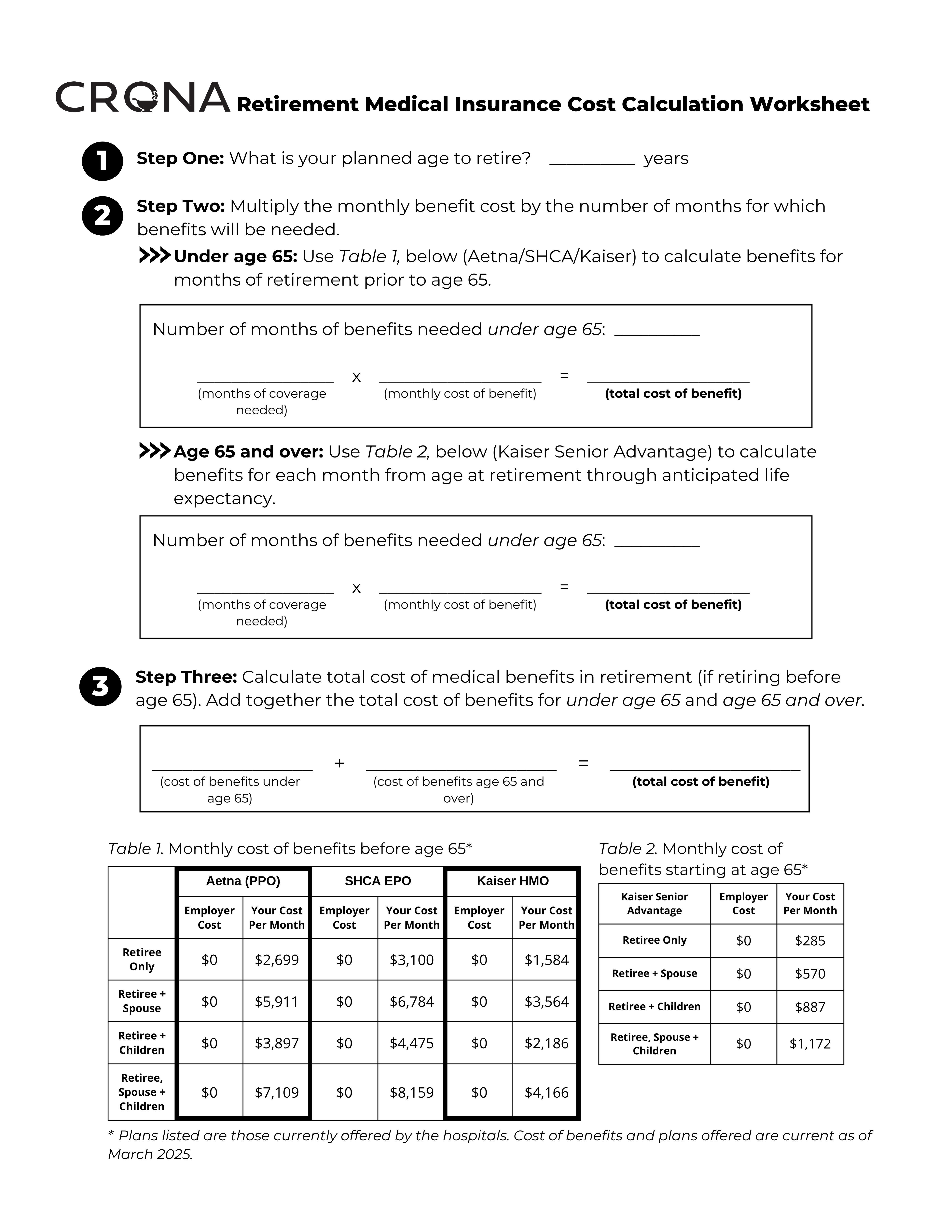Welcome to the
CRONA 2025 Negotiations
Information Page
“DIVERSITY IS OUR STRENGTH, UNITY IS OUR POWER”

NEGOTIATIONS Updates
💙💪 Latest on Economics + Answering Your Questions March 27, 2025
Dear CRONA Nurses:
More than 1,000 CRONA Nurses attended last night’s webinar! Throughout CRONA’s history, our strength has always stemmed from the dedication and engagement of our Nurses, our commitment to excellence, and most importantly, our unity. It was wonderful to see so many Nurses tuning in to stay informed.
CRONA Nurses are engaged, educated, and ready to advocate for each other and their patients.
We have a couple of events coming soon! Details and RSVP link are included after the negotiations updates, so make sure to read to the end of this eblast.
Three big topics for today: (1) the latest on CRONA’s proposals, (2) understanding the hospitals’ “side-by-side”, and (3) your burning questions answered.
Latest on CRONA’s Proposals
Yesterday, CRONA responded on several outstanding non-economic proposals and today, CRONA responded on economics. CRONA tried to problem solve and we are hoping the hospitals will do the same. The Side-by-Side below has the updates, but just a few notes:
Wages.
CRONA revised its wage demand to 6%, 5%, 5%. The hospitals’ last counter was 3% in each of the contract years. The hospitals have said “NO” to almost any other economic proposal, saying they want to put all their money into wages. We hope the hospitals are taking CRONA’s wage proposal seriously. CRONA’s demand is reasonable and would ensure that our Nurses stay ahead of other Bay Area hospitals.
Right to Have a Co-Worker Cover Your Shift Without Being Penalized By Having to Use PTO.
CRONA is holding strong on this proposal, despite the hospitals’ continued refusal to recognize that our proposal is good for Nurses and good for the hospital. Today, the hospitals said that Stanford could agree to post its schedule 3 weeks in advance, but only if CRONA withdraws this PTO proposal. CRONA will respond at the bargaining table.
Retiree Medical Benefits.
Despite CRONA providing expert analysis and detailed explanations of the deficiencies in our retiree medical benefits (more on that below), the hospitals continue to refuse to even engage in a discussion of how to improve the benefits. Today, CRONA made a revised proposal, which would still significantly increase the current benefit in the first year of the contract, and then provide 5% increases annually–to account for the ever-increasing cost of health care.
Relief Nurse Differential.
The hospitals have provided ZERO explanation as to why they think a $2 increase in the differential, and only for Limited, A, and B Relief Nurses, is sufficient – when Bay Area hospitals pay much more. Our Relief Nurse program suffers from the hospitals’ nickel and diming. Today, in an effort to make progress on this issue, CRONA made a revised proposal of a 15% differential for Limited, A, and B Relief Nurses, and 10% for C and D.
PNDP.
Yesterday, CRONA made a revised PNDP proposal to the hospitals that met their claimed “core element” for ADNs and diploma Nurses: CRONA agreed to length of service requirements for these Nurses. CRONA did not agree that there was any good or rational reason to deny points to Nurses with BSN degrees. Today, the hospitals told us they won’t consider a pathway for non-BSN Nurses unless CRONA agrees to make the PNDP harder for everyone else. We will respond at the bargaining table.
New Technology.
Today, we reached agreement on a new provision addressing use of new technology, including AI. The new provision will confirm that use of technology should not limit a Nurse’s exercise of clinical judgment and that, while technology may affect nursing duties, it is not intended to be used to eliminate the Nurse’s role in the delivery of patient care.
Understanding the Hospitals’ “Side-by-Side”
Yesterday, Stanford management debuted their own side-by-side that only highlights their failure to date to address many of the real issues CRONA Nurses care about. These are core components of making nursing a sustainable, long-term profession. We know the hospitals’ “side-by-side” was long, so we focus on a few examples.
Retiree Medical Benefits
In their side-by-side, the hospitals acknowledged that CRONA proposed to increase the Health Reimbursement Account benefit, more commonly known as the Group D benefit. They go on to say, “CRONA says the Hospitals said NO.” Correct. We did say that. That is because the hospitals said NO – not just once, but three times. (March 11, March 19, and March 25, to be exact.)
As we have previously shared with you, CRONA worked with experts to analyze our current “Group D” benefit and evaluate whether it was adequate to cover the cost of Nurses’ healthcare in retirement, after Nurses have spent their working lives providing care for others. It is not. It is not even close. As we shared with you and with the hospitals at the bargaining table, for some retirees, the Group D benefit will last only months or a few years. We even gave you a calculator so you could do your own math.
CRONA also worked with the experts to compare Stanford’s retiree medical benefits to those offered at Kaiser and UCSF. We shared all of that information with the hospitals. In response, the hospitals have just said “NO.” Three times.
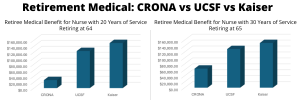
“But we made improvements in 2022.” That is the long and short of the hospitals’ reasoning for not engaging with CRONA’s proposal in these negotiations.
It is true that CRONA fought hard for improvements to retiree medical benefits in 2022, and previously in 2019 and in 2016. But the math does not lie: Group D still does not come close to being a benefit that Nurses can rely on to cover a significant portion of their health care costs in retirement.
So what did the hospitals say about retiree medical in their side-by-side yesterday? Well, they said “NO” in a whole lot of words. They shared information from an industry survey (a survey in which the UCs do not participate). Unless the hospitals prefer to align themselves with companies racing to the bottom in terms of employee benefits, the information is really not relevant.

Tentative Agreements
The hospitals are anxious to tout the “tentative agreements” we have reached to date. What this means is that there is progress. We agree there is progress.
But all of these agreements only take effect if we reach an overall agreement on the issues that are still unresolved: wages, reduced commitments, use of PTO, weekend staffing, and more.
In earlier side-by-sides – perhaps ones we put out before the hospitals were so closely watching our side-by-sides – we highlighted where we had reached agreement. We have tentative agreements on things like workplace violence prevention, information requests, and grievance and arbitration. Many of the changes are simple common sense. Let’s take two examples of areas of agreement that the hospitals seem upset we “omitted” from our side-by-side of outstanding issues.
Safe Staffing. CRONA secured groundbreaking contract language regarding staffing in 2022. Among those improvements was a requirement that every unit – not just units already covered by the California Title 22 “ratio” laws – must have a staffing plan and that the staffing plan be accessible to the Nurses. Since securing that language, CRONA Nurses have reported that several areas and units did not have staffing plans that were readily available to Nurses. So to make this requirement meaningful, we pushed for and won an agreement by the hospitals to require all units at both hospitals to make their staffing plans available to Nurses “in electronic form and in hard copy.”
Information Requests. As part of executing our duties in representing CRONA Nurses, we frequently request information from the hospitals. Existing contract language specifies how CRONA makes the requests, and that the hospitals must provide the requested information to the extent that it is relevant and necessary to CRONA’s representation responsibilities. While the LPCH contract already includes a requirement that the information be provided within 10 days, the SHC contract does not. So we proposed including the same timeline and SHC agreed. CRONA also got the hospitals to agree that, when they claim that the requested information is confidential, such a claim does not relieve them of the duty to provide the information.
Other “tentative agreements” include updating dates in the Education Reimbursement provisions, revising the number of days’ notice for investigatory interviews, and agreeing to include Side Letters that were agreed during the last three years as part of the printed contracts.
These tentative agreements are certainly meaningful and will improve CRONA’s ability to enforce the contracts. In terms of making sure all Nurses stay informed, CRONA has chosen to focus its attention on the outstanding issues and Nurses’ core priorities.
Bottom Line. Your CRONA Negotiations Committee has been clear from the start: we need flexibility in scheduling and PTO usage, a more accessible PNDP, and wages that ensure the Stanford hospitals remain best in class.
CRONA’s side-by-sides will continue to highlight the areas that are still in dispute and where, so far, Stanford management is falling short. Despite making $1.6 billion in revenue over the past three years, Stanford expects CRONA Nurses to be impressed by tentative agreements that cost them nothing.
Answering Your Burning Questions
What Happens If We Don’t Reach a Deal by March 31?
We have told the hospitals that we are available and willing to meet all weekend, and we remain hopeful that these discussions will secure strong contracts. However, if we do not reach an agreement by the time our contracts expire on Monday, March 31, rest assured that CRONA is prepared to continue negotiating.
If our contracts expire without an agreement, CRONA Nurses must continue to work in the hospitals, and we will operate under the terms of our existing contracts until a new agreement is reached.
Currently, we do not have scheduled bargaining dates beyond the contracts’ expiration, but CRONA is fully prepared to keep negotiating as necessary. Our priority is to secure the strong contracts Nurses deserve.
Understanding the Strike Process
It is never CRONA’s goal to strike. And CRONA will exhaust all efforts at the table before considering a strike. Many of you have reached out with questions about how a strike works, so here is some baseline information. There is a process we must follow before any strike can take place.
First, your CRONA Executive Board would need to call for a strike authorization vote. The strike authorization vote is an in-person vote and would be widely announced, with CRONA providing information about the vote and what it means. Importantly, a vote to authorize the CRONA Executive Board to call for a strike does not mean that the Board will do so immediately—it simply means that CRONA members give the Executive Board the authority to do so if and when necessary. This is an important step in ensuring that the entire membership is united and prepared for such a decision. Federal law also requires that we give a minimum of 10 days’ notice to the hospitals before any strike can occur.
If negotiations at the table are not showing progress, you can expect plenty of communication from CRONA. We will keep you informed every step of the way, starting with any strike authorization vote, followed by guidance on how to plan for a potential strike and make contingency plans, and, finally, advance notice if a strike is called.
We hope that none of this process will be necessary. We have every intention of working hard to get a deal before our contracts expire.
Stay tuned for updates, and know that CRONA is committed to keeping you in the loop throughout the entire process.
Upcoming Events 🗓️

CRONA Unity Day – Monday, March 31st!
Monday, March 31st is the last day of our contracts, and we want to make a bold, unified statement. Show your CRONA pride by wearing blue and bringing your CRONA gear to work! Whether it’s your CRONA pens, badge reels, lunch bags, water bottles, or that cozy CRONA hoodie, we want to see you rocking it. If you can wear a t-shirt under your scrub top, be sure it’s your CRONA t-shirt. And don’t forget to sport your CRONA buttons – they’re the perfect finishing touch!
🚨Important Reminder: The only items you should not wear are those from the 2022 strike, like the “strike” t-shirt or “I did not cross” buttons. Let’s keep it all about today’s strength and unity!
No CRONA gear? No problem – we’ll be out at the hospitals bright and early Monday morning handing out UNITY buttons so you can join in on the fun.
Let’s show the hospitals that we are stronger together, united in our support for each other and for our nursing profession. 💙

[RSVP link in email]
🎉Join us to celebrate our strength and unity. Whether we are celebrating new contracts, or continuing to build power together if negotiations are still ongoing, it will be a great event to connect with fellow Nurses. Your families are welcome too! Details below, and be sure to RSVP!
CRONA Unity Celebration
Sunday, April 13
3:00 – 7:00 pm
Devil’s Canyon Brewing Company
935 Washington Street
San Carlos, CA 94070
Q: Can I bring my family, including kids?
A: Yes, this event is for CRONA Nurses and their families.
Q: Will there be food?
A: We will have a variety of food trucks. Each person will receive a ticket to redeem for food and non-alcoholic beverage. Make sure to check in at the entrance to get your food tickets! The venue makes its own beer (and root beer!); alcoholic beverages must be purchased.
Q: Is there parking?
A: Yes, there is a parking lot and surrounding street parking.
Q: Can I get a CRONA t-shirt?
A: Yes, we will have t-shirts to give away; one for each Nurse. Get your shirt early for best choice of sizes. These are the CRONA blue unisex style shirts with logo.
Q: I like the fun fashion styles and colors of the CRONA clothing I’ve seen other Nurses wearing. Can I get any of that?
A: The vendor who makes those items for sale will have a space at the event. They will have ready made items available for purchase and accept orders for anything not in current stock.
Q: Why are you asking for RSVPs?
A: We want to make sure to have plenty of food!
Q: Can I come with my coworkers instead of my family?
A: Of course! You may also come by yourself and meet new CRONA Nurse friends!
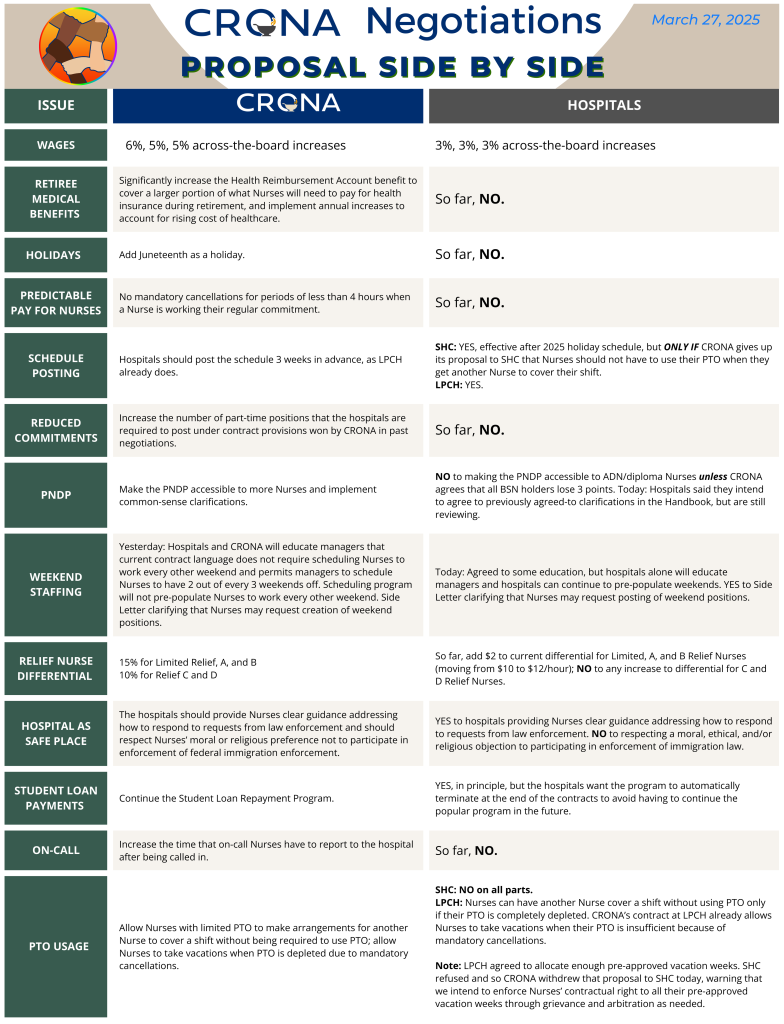
💙💪Where CRONA Nurses Stand, Week 10 of Negotiations March 25, 2025
Dear CRONA Nurses:
We are now in the last week of our contracts, and our tenth week of negotiations.
It was great to talk with many of you this past weekend as CRONA rounded in the hospitals. CRONA Nurses are informed, engaged, and clear about our priorities. Today, CRONA presented revised economic proposals to the hospitals, along with new proposals addressing new technology and a Nurse’s right to refrain from enforcing immigration law. CRONA held strong on wages, an enhanced Relief Differential, improved retiree medical benefits, and cancellation protections for Nurses.
The hospitals responded to CRONA’s revised economic proposals a few hours later and also presented a revised PNDP proposal, after CRONA last week called out the hospitals for walking away from the progress the parties had made. See the updated Side-by-Side below for a summary of where we are now.
CRONA has been clear from the start of these negotiations: our goal is to make nursing a sustainable profession.
That means:
- Wage increases that keep up with inflation and provide Nurses with the security we need to show up every day for our patients and their families and provide the world-class patient care the hospitals rely on us for.
- Increasing the number of part-time positions available across the hospitals.
- Ensuring that Nurses are able to retire from the hospitals with a retiree medical benefit that covers a significant portion of health care premiums in the Nurses’ retirement.
- Giving Nurses the ability to make personal plans by posting schedules three weeks in advance at both hospitals.
- Allowing Nurses with low PTO banks to arrange coverage for a shift without being penalized by having to use PTO.
- Making sure Nurses can take the vacations promised to them under the contract and negotiated policies.
- Supporting every Nurse who wants to develop and become an expert in their area.
CRONA will continue to fight for real changes and fair wages.
Wages
Today, the hospitals increased their previous wage proposal by 1%. This means they are proposing a 3% increase in each year of the contract.
CRONA has explained to the hospitals that, for wage increases to be meaningful, they need to do more than merely keep up with the cost of living.
The hospitals have said that a 3% increase should be sufficient because it keeps CRONA Nurses even with Kaiser, which has a planned 5.25% increase scheduled for January 1, 2026. CRONA disagrees.
CRONA Nurses also know that just keeping pace with Kaiser, which has more robust medical retiree and other benefits, is not enough.
We see that the Stanford leaders have started giving presentations about the need for “fiscal responsibility” and “efficiency.” At the table, the hospitals shared information about other hospital systems implementing cost cutting measures and hiring freezes. (To be clear, however, some of those cost cutting measures are reductions in administrative, management, and business functions–with no reductions in patient care roles.)
But the Stanford hospitals made $1.634 billion over the last three years. Stanford management has not claimed the hospitals cannot afford the wages CRONA is demanding. The hospitals should stop trying to scare Nurses.
The hospitals are proud of their growth, their awards, their expansion into new treatment areas, and of providing care to some of the most acutely ill and medically complex patients in the state, if not the country. All of those accomplishments depend on our skill and dedication as CRONA Nurses.
We deserve to lead the industry on wages and we are letting the hospitals know that.
PNDP
We previously wrote to you about how the hospitals essentially took their ball and went home—withdrawing all their PNDP proposals when CRONA refused to agree that ADN and diploma Nurses could not be experts. After that, the hospitals sent a message to all Nurses saying that they were actually “still open to negotiating PNDP,” but that CRONA had rejected “key components” identified by the hospitals.
Today, we learned what those two components were: (1) increased requirements for diploma/ADN Nurses with respect to the time they have worked as RNs, at the hospitals, and in their area of specialty; and (2) the elimination of the 3 points for BSN degrees.
The hospitals did not explain why making the PNDP more accessible for diploma/ADN Nurses should mean that the vast majority of Nurses in the PNDP should automatically lose points. There is simply no logical reason to tie these two demands together. CRONA will not fall for this divide-and-conquer tactic.
Last week, CRONA presented the hospitals with a proposal that would have included some increased requirements for diploma/ADN Nurses (for time worked as an RN and at the hospitals). Today, the hospitals rejected that proposal.

Meet Simon and Jackie
Several weeks ago, CRONA Associate Nurse Advocates Simon and Jackie presented their stories to the hospitals’ negotiating team. Simon is a diploma nurse and Jackie has an ADN. But both are Clinical Nurse IVs and currently sit on the PNDP Panel. Their remarkable contributions show that expertise does not depend only on the degree you have.
Simon. Simon graduated from a college in Hamilton, Ontario, Canada with a diploma in nursing. When he started at Stanford 12 years later, he had worked in a variety of emergency rooms at Level 1 trauma centers, teaching hospitals, and community and inner-city hospitals. He started in the Stanford Emergency Department, where he was a Resource Nurse and trauma nurse, sat on multiple committees, and was even voted Nurse of the Year.
Several years later, Simon transferred to the Cath Lab, excited to take care of some of the sickest patients in the hospital and help perform incredibly complex procedures. Simon is now trained in all three services in the Cath Lab: Cardiac, Neurointerventional, and Vascular. These services all involve highly complex care, for example: performing vertebroplasties, biopsies and diagnostic cerebral angiograms on the sickest intubated patients; revascularizing ischemic limbs and placing stent grafts in aortic aneurysms; and providing care for ECMO patients without an anesthesiologist or perfusionist.
Simon also participates in the Hybrid Committee, which addresses cases that need both Cath and OR teams. He cross-trained in the CVOR and learned a new specialty from the incredible CVOR team. Simon is proud of the Hybrid Committee’s work, including pioneering a hybrid vascular team that is now covering cardiac, structural and electrophysiology.
If you know Simon, you know he is very modest. But there can be no doubt that he is an expert. He deserves to be a Clinical Nurse IV – and not just because he came to the hospital at a time when his lack of a BSN could be “waived.”
Jackie. Jackie is a Clinical Nurse IV who has worked for 27 years at SHC, contributing to her unit and the hospital as a bedside Nurse, a Resource Nurse, and preceptor, and serving on numerous committees, including the Pain Committee, Shared Leadership, and the Call Committee. She helped open the outpatient surgery center in Redwood City, and she trained the staff in her unit. She has presented multiple in-services, is an EPIC superuser and a superuser champion on multiple pieces of equipment, and has worked to develop flow sheets and communication tools that Nurses regularly use. During COVID, she oversaw the vaccine program in the evening, after her regular shifts. She is also triple certified and attends conferences in her specialty. And she spends many hours doing volunteer work and making the effort to keep morale high on her unit by being supportive and fun. In other words, Jackie is a leader and an expert Nurse.
Jackie is also a Nurse with an Associate’s degree. She obtained her degree in 1993, after growing up as an immigrant child raised by her mother when her father passed away. Jackie has served on the PNDP Panel and coached many Nurses, in her department and beyond, to help them obtain their Clinical Nurse III and IV designations. Jackie has also demonstrated time and again that she is an expert who deserves to be a Clinical Nurse IV.
CRONA Supports Future Leaders and Experts
There are Nurses at the hospitals now who are future Simons and future Jackies. It is short-sighted and irresponsible of the hospitals to refuse to create a path forward for them to become Clinical Nurse IVs.
As our contract expiration date approaches next Monday, March 31st, please stay tuned for more information regarding what that will mean for your day-to-day work and possible events we may have in the works to show our unity and strength.

Tomorrow is Webinar Wednesday!
Please join us for a special webinar on Wednesday, March 26 at 8 pm where we’ll discuss the latest updates in negotiations and share information about our plans for the next weeks.
Look for the login information via email and text notification tomorrow.
As our contract expiration date approaches next Monday, March 31st, please stay tuned for more information regarding what that will mean for your day-to-day work and possible events we may have in the works to show our unity and strength.

Looking Ahead
🎉CRONA Nurses Unity Celebration: On Sunday April 13, CRONA Nurses are throwing a party! Join us to celebrate our power and unity. Whether we are celebrating a new contract, or continuing to build power together as negotiations continue, it will be a great event to connect with fellow Nurses. Your families are welcome too!
🤩Be Sure to Follow Us on Social Media: This next week is crucial as we work towards strong contracts for CRONA Nurses. Be sure you’re up to date with the latest info by following our social media pages (@CRONANurses on Instagram and CRONA Nurses on Facebook). We’ll be sharing the most current updates on our social media channels (not to mention some great memes!)
Current Side-by-Side:
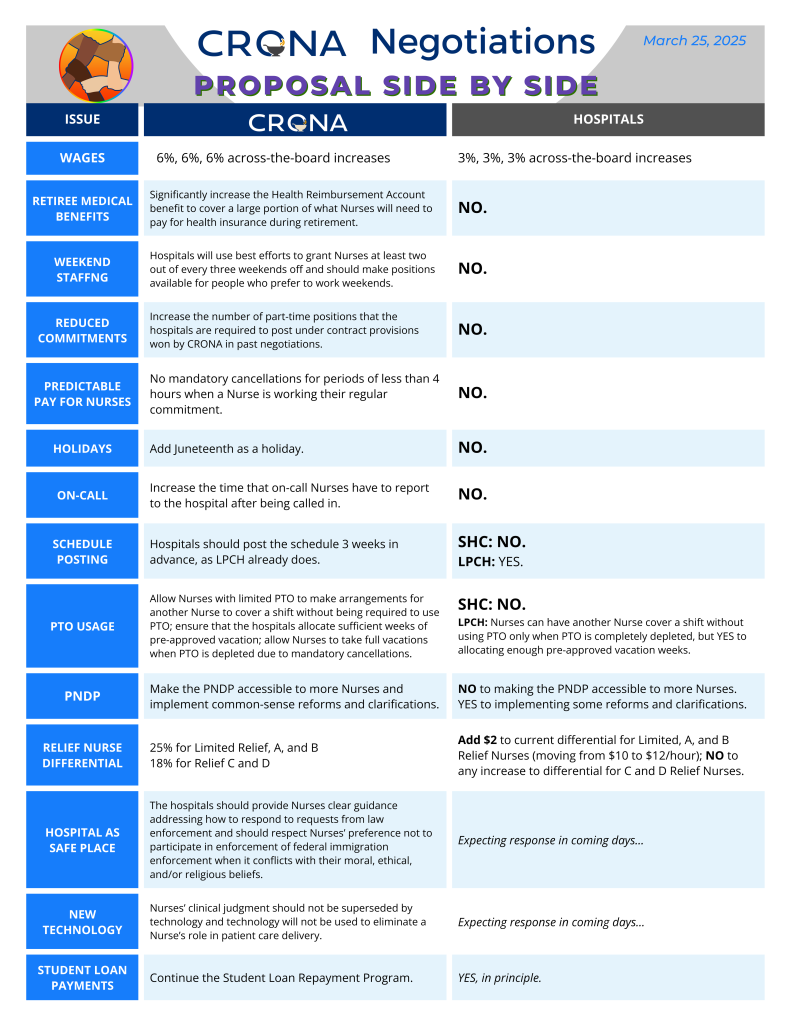
💙💪 CRONA Responds on Non-Economics and Fights for PNDP Improvements March 20, 2025
Dear CRONA Nurses:
Today, CRONA responded to the hospitals’ withdrawal of their PNDP proposal by continuing to advocate for common-sense reforms. We also responded on the outstanding non-economic issues.
As we wrap up our ninth week of negotiations, CRONA stands united in our commitment to securing the strong contract that Nurses deserve. Now is the time for solidarity, as our collective voice is more powerful than ever. Together, we will ensure that our hard work and dedication is recognized in the contracts we secure.
Look for your CRONA team in the hospitals this weekend! We will be out and about, talking to Nurses on their breaks.
CRONA Pushes Forward to Improve the PNDP for All Nurses
Yesterday, we told you that the hospitals threw up their hands and withdrew their PNDP proposal rather than continue to engage in the discussions we think Nurses need to improve the PNDP program. CRONA tried to get the parties back to work today by presenting a revised PNDP proposal. CRONA’s new proposal maintains a pathway for ADN/diploma Nurses to become Clinical Nurse IIIs and IVs. (Before the hospitals withdrew their proposals, they proposed limiting ADN/diploma Nurses to becoming Clinical Nurse IIIs.)
CRONA Responds on Non-Economic Issues
CRONA told the hospitals that it was holding strong on several of its key proposals on non-economic issues. Improving weekend staffing and increasing reduced commitments are priorities for Nurses. CRONA also presented revised non-economic proposals on new technology and Nurses’ right to refrain from aiding in enforcement of federal immigration law. Check out the updated Side-by-Side below.
Today, we highlight two outstanding proposals that many Nurses have written to us about: Stanford’s refusal (so far) to agree to post schedules three weeks in advance, and the hospitals’ proposal to have job postings that would suggest Nurses could be assigned to locations up to 50 miles away.
👉Schedule Posting at Stanford 📆
So many of you have asked why Stanford will not agree to publish Nurses’ schedules three weeks in advance, as Stanford Children’s already does. We think the hospitals may be confused. Today, we provided the hospitals with the Stanford schedule calendar, showing that–even if the schedule is posted three weeks in advance–hospital management would still have the same time (2 weeks) to balance the schedule. There is no increased burden to the hospital. It is time for Stanford to agree to this proposal, which would bring significant improvements to Nurses’ abilities to plan around their work schedules.

👉Assignments to Multiple Locations 🗺️
Today, we asked the hospitals about their proposal to change language relating to Nurses who are assigned to work at multiple locations. The contracts clearly prohibit the hospitals from regularly assigning Nurses to work in a location that is more than 35 miles from the Nurse’s primary work location, without the Nurse’s agreement to such assignment, unless there is a critical staffing shortage.
The hospitals’ proposal does not change that requirement. But the hospitals want to change provisions regarding postings for new positions, so that the job postings could tell Nurses they might be assigned to locations farther than 50 miles away. We asked the hospitals to explain what they intended with this language and they said they’d get back to us. We’ll wait to hear back, but no job posting should suggest that Nurses can be assigned to locations 50 miles away when the contracts clearly prohibit the hospitals from requiring this.
Updated Side-by-Side:
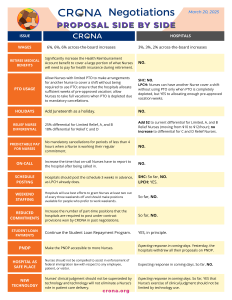
Questions About What Comes Next? Stay Engaged, Stay Informed
We know that, as contract expiration approaches on March 31, many Nurses have questions about what comes next. CRONA’s goal is to secure strong contracts, and we want you to be prepared for all possibilities. Please continue to read our e-blasts, and be sure to follow us on Instagram (@cronanurses) and Facebook (facebook.com/CRONAnurses). And see below for details about our next webinar.
Save the Date! Upcoming Events 🗓️

🎉CRONA Nurses Unity Celebration: We’re throwing a big ol’ unity event! Mark your calendar for Sunday April 13 to celebrate the power and unity of CRONA Nurses. We may be celebrating a new contract or we’ll be building pep and power as negotiations continue. No matter what, we’ll have delicious food trucks, fun activities, and a chance to hang out with fellow Nurses. Families welcome!
March Webinar Next Week: Our upcoming CRONA Membership Webinar is set for Wednesday, March 26 at 8 pm. We’ll plan to discuss all of the latest updates and share more information about our plans for the next few weeks.
💙💪 Hospitals Respond to CRONA March 19, 2025
Dear CRONA Nurses:
With negotiations ramping up, we’re coming to you with a mid-week check in. Today, the hospitals withdrew their entire PNDP proposal and responded to CRONA’s other economic and non-economic proposals, including those we presented yesterday. The hospitals also stuck to three of four take-back proposals.
CRONA told the hospitals that we are concerned they are confusing a speedy response with significant movement. But the Negotiation Team is committed to carefully reviewing the hospitals’ counter-proposals and will respond at the bargaining table.
Today’s developments are detailed in the updated Side-by-Side below, but the short story is that the hospitals moved 1% on wages and proposed to increase the Relief Nurse differential by $2 only for Relief A, B and Limited Relief Nurses. In some good news, the hospitals withdrew their proposal to upend the Call Committees and On Call procedures, after CRONA’s explanation last week about how ill-advised that proposal was.
With our contracts expiring on March 31, the time is now for the hospitals to take CRONA’s proposals seriously. Your CRONA Negotiations team is at the negotiating table and ready to fight for what Nurses deserve. Let’s do this!
Hospitals Cite Need For Efficiencies and Fiscal Responsibility
The hospitals prefaced their 3%, 3%, 2% wage proposals today with an ode to fiscal responsibility. But as we previously shared, the hospitals have enormous operating surpluses. Let’s do the math.
In the last three years:
- In 2022, SHC and LPCH together had $523 million in surplus.
- In 2023, SHC and LPCH together had $496 million in surplus.
- In 2024, SHC and LPCH together had $615 million in surplus.
That is $1.634 billion in surplus in three years – despite paying CRONA Nurses increases of 7% (5% + 2%), 5%, and 5% in 2022-2024.

Hospitals Abandon Efforts to Improve the PNDP
CRONA is disappointed that–despite CRONA’s willingness to engage with the hospitals to do the hard work needed to negotiate an improved PNDP–the hospitals told CRONA today that they were completely withdrawing their PNDP proposals today. This, even though there are multiple, common-sense changes that would make the PNDP more user-friendly that were supported by PNDP panel members from the hospitals and CRONA.
In withdrawing their PNDP proposals, the hospitals suggested they could only see a path toward opening the PNDP for ADNs and diploma Nurses (and only for CN III status) if they could also eliminate points for all Nurses holding BSNs.
The hospitals’ decision to walk away from the real changes needed to make the PNDP a program in which all Nurses can excel is ultimately not good for the hospitals or for Nurses. CRONA has not withdrawn its PNDP proposal. Stay tuned for further updates.
Hospitals’ Latest Responses
CRONA is reviewing the proposals the hospitals presented today, but the Negotiation Team conveyed disappointment in the limited movement made by the hospitals and noted the hospitals’ continued refusal to engage on non-economic proposals that are important to Nurses, like improved weekend scheduling and access to part-time positions. Your Negotiation Team is working hard to focus the negotiations on issues that matter and move the negotiations forward. See below for an updated Side-by-Side.
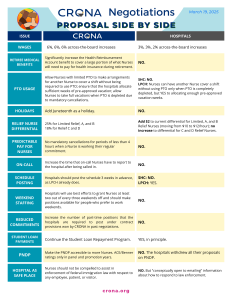
Remember to Stay Engaged – Read Your E-Blasts and Follow Us on Social Media! 🔔
As we reach the final weeks of March, negotiations are picking up speed, and our goal is to make sure every CRONA Nurse has the latest information. Things change quickly, and we want you to be as informed as possible – because an educated Nurse is an empowered Nurse!
For all of the latest updates on negotiations and events, please continue to read our e-blasts, and be sure to follow us on social media on Instagram (@cronanurses) and Facebook (facebook.com/CRONAnurses). As things pick up, our social media accounts will have all of the latest information.
Save the Date! Upcoming Events 🗓️
Second March Webinar: In one week! Our next monthly CRONA Membership Webinar is set for next Wednesday, March 26 at 8 pm. We’ll plan to discuss all of the latest updates and share more information about our plans for the next few weeks.

🎉CRONA Nurses Unity Celebration: We’re throwing a big ol’ unity event! Mark your calendar for Sunday April 13 to celebrate the power and unity of CRONA Nurses. We may be celebrating a new contract or we’ll be building pep and power as negotiations continue. No matter what, we’ll have delicious food trucks, fun activities, and a chance to hang out with fellow Nurses. Families welcome!
💙💪 CRONA Responds: Updated Economic and Non-Economic Proposals March 18, 2025
Dear CRONA Nurses:
It was wonderful to see so many of you at the Donuts and Coffee yesterday! It’s a big week for negotiations.
Our current contracts expire in just under two weeks on March 31 and we are laser-focused on winning new, strong labor agreements.
CRONA’s Latest Proposals + Side by Side
Today, the CRONA Negotiations Team presented updated economic and non-economic proposals to the hospitals. CRONA provided a strong counter-proposal on wages and made significant moves on several other issues, deliberately narrowing the issues that remain in dispute. CRONA made these moves in recognition that time is short and the parties should focus on making progress in ways that will make a meaningful difference to Nurses.
Now it is time for the hospitals to engage seriously with the economic issues such as wages and retiree medical benefits. CRONA explained that Nurses need real wage increases that do more than keep pace with inflation, and that inflation is on the rise.
CRONA also presented a detailed analysis of retiree medical benefits by experts it retained. The experts compared the retiree medical benefits at the Stanford hospitals to the value of Kaiser and UCSF’s retiree medical benefits.
Here are just two examples of what the comparative analysis shows:
💙A CRONA Nurse who retires after 20 years of service at age 55 will receive a retiree medical benefit of $21,705, which is 3.76% of the total estimated amount the Nurse will spend on premiums, if they live to age 90 ($577,696) assuming the Nurse is covered by Aetna (pre-65) and Kaiser Senior Advantage (post-65).
By comparison: A Kaiser nurse who retires after 20 years of service at age 55, and who lives to age 90, will receive retiree benefits totaling an estimated $153,000, or 26.48% of the total estimated amount that will need to be spent on healthcare premiums, assuming the nurse is on these same health plans.
💙A CRONA Nurse who retires after 25 years of service at age 65 will receive a retiree medical benefit of $51,473, which is 31.39% of the total estimated amount the Nurse will spend on premiums if they live to age 90 ($163,972), assuming the Nurse is covered by Kaiser Senior Advantage.
By comparison: A UCSF nurse who retires after 25 years of service at age 65, and who lives to age 90, will receive retiree benefits totaling an estimated $129,600, or 79.04% of the total estimated amount that will need to be spent on healthcare premiums, assuming the nurse is on the same plan.
It is also time for the hospitals to engage on the important outstanding non-economic issues. These are issues that matter to Nurses. They include:
- Increased flexibility in PTO usage
- Improved weekend staffing
- Increased access to part-time positions
- Posting schedules at SHC with sufficient time for Nurses to plan their lives
To date, the hospitals have just said “NO.” It is time for them to take these proposals seriously.
We expect to hear back from the hospitals in the coming days. Until then, here is an updated Side-by-Side.
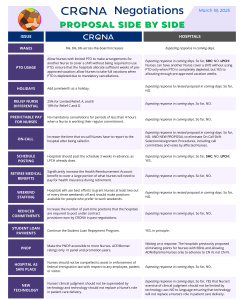
🎉CRONA Nurses Unity Celebration – Sunday, April 13 🎉
CRONA Nurses, mark your calendars! We’re throwing a special event on Sunday, April 13 – and you’re not going to want to miss it. We’re calling it a celebration, but depending on where we stand, it could be a celebration of a strong contract, a pep rally as negotiations continue, or simply a big ol’ unity party to show our strength and solidarity. 💪
No matter the direction, we want YOU there to share in the fun, the food, and the spirit of unity. We’ll have delicious food trucks, fun activities, and a chance to hang out with fellow Nurses. Bring your families – the more, the merrier! See you there.
Second March Webinar: Our next monthly CRONA Membership Webinar is set for next Wednesday, March 26 at 8 pm. We know a lot of Nurses have questions ahead of contract expiration, and we want to make sure everyone has as much information as possible.
Contract Expiration: As you know, our current contracts are set to expire on March 31. As we approach the end of March, we will continue to keep everyone updated. Please be sure to keep an eye on your email and our social media @cronanurses for further information.
Donuts and Coffee Recap: Thank you to everyone who braved the weather and said hello during our Donuts and Coffee event. It was great to connect with so many Nurses and hear about what issues are most important to them. We handed out more than 600 donuts!
💙💪CRONA Update & Spotlight on On-Call and Immigration Enforcement March 13, 2025
Dear CRONA Nurses:
Wow! Nearly 1,000 CRONA Nurses showed up to yesterday’s Webinar. You had great questions. For all of CRONA’s history, our strength and power have come from how engaged CRONA Nurses are, CRONA Nurses’ commitment to excellence, and our unity. That shone through in the Webinar.
Get informed, get involved, and get ready – as we head into the final weeks of March. Our contracts expire on March 31.
This week, the hospitals responded to CRONA’s economic proposals. Your Negotiation Team is working on a response.
Yesterday, CRONA responded to two “take back” proposals the hospitals made on Monday:
- Call Procedures. CRONA rejected the hospitals’ proposal to eliminate the contractual protections for call shift selection and assignment procedures.
- Floating. CRONA rejected the hospitals’ proposal to expand the distance for which notification of floating is required from 35 miles to 50.
Today, CRONA presented the hospitals with updated proposals on:
- New Technology, a forward looking proposal to prepare and protect Nurses for how AI could impact our jobs.
- Safeguarding Privacy and Protected Areas, which relates to CRONA Nurses and immigration enforcement.
Our spotlights today are on call procedures and preparing for immigration enforcement.
Want to review the current Side-by-Sides on our economic and non-economic proposals? You will find them at the bottom of today’s newsletter.
Spotlight: Hospitals Propose to Eliminate Call Committees, Call Procedures, and Nurses’ Right to Vote on Call Assignment and Selection Rules
CRONA rejected the hospitals’ proposal to eliminate the contractual requirements for determining On Call procedures. Specifically, the hospitals’ proposal would entirely remove: (1) the default procedures for call shift assignment and selection, (2) the provisions for Call Committees, and (3) the requirement that changes to existing procedures be voted on by affected Nurses.
The hospitals’ explanation was that their goal is to “strip out the onerous process of a vote.” In other words, management alone would establish the call policy.
Nurses have long had the right to vote on On Call procedures, which are procedures that are proposed by Call Committees that involve Nurses and other employees who take call, along with managers.
The hospitals’ proposal to place decisions about On Call solely in the hands of managers, who rarely work On Call themselves, is completely unacceptable and disrespectful.
Areas that have On Call duty and are governed by the contracts’ procedures include:
- ORs
- PACU
- Cath Lab
- Endoscopy
- Apheresis
- Outpatient Surgery
- New ACA Areas
- Any other inpatient and outpatient unit that decides to institute On Call
Spotlight: Respecting Nurses’ Right Not to Assist in Immigration Enforcement
On January 20, 2025, the federal government reversed a policy that protected areas such as churches, schools, and hospitals from immigration enforcement—instead giving Immigration and Customs Enforcement (ICE) agents broad power to take enforcement action in these areas.
As Nurses, we are privileged to serve in a profession that has the highest level of public trust. That means a lot to us. When a patient comes to the hospital, we are there to protect and support them regardless of immigration status, financial status, religion, or anything else.
On January 29, CRONA proposed contract language that would protect Nurses by respecting Nurses’ right not to assist in immigration enforcement with respect to a co-worker, a patient, or patient family member. We waited and we waited. And on March 3, more than a month later, the hospitals said “NO.”
The hospitals claim their existing procedures are sufficient, but your Negotiation Team reviewed their policies and they don’t have any policies that clearly tell a Nurse how to react if confronted by an ICE agent. At the table, the hospitals could not say whether Security requires, or would require, a judicial warrant from ICE agents.
Given the hospitals’ inadequate response, your Negotiation Team did the work. Our team members went to an Emergency Nurses Association seminar and learned about best practices. Other team members researched Bay Area hospital policies.
Today, we presented what we learned to the hospitals and described some of the best practices adopted in other hospitals. We shared UCSF’s ICE Workflow graphic as an example. It is, frankly, embarrassing and irresponsible that almost two months after the hospitals’ protected status was removed, Stanford and Stanford Children’s have yet to communicate any uniform message or instruction about how Nurses and other health care professionals should respond to ICE. The hospitals are unprepared and, as a result, we as Nurses could be left unprotected.
CRONA’s proposal is simple and straightforward: No Nurse should be compelled “to assist in the enforcement of federal immigration law, including by gathering or disseminating information that may be used for immigration enforcement as to any employee, patient, or visitor.”
UCSF’s Immigration and Customs Enforcement (ICE) ED Workflow:
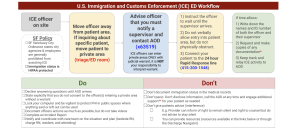
We Want to Hear from You! Share Your Story of Arranging Coverage (or Not Being Able To)!
CRONA continues to push for the hospitals to allow Nurses who do not have large PTO banks to have a co-worker cover for them and not be forced to use their own PTO. The hospitals don’t seem to understand why this is good for staffing and good for making nursing sustainable.
Do you have a story about how you arranged coverage with a co-worker, or maybe how you were not able to do so because you didn’t have enough PTO? We want to hear from you!
As you know, your voice is a critical tool in bargaining and helps us paint a picture of what working conditions are really like at Stanford Hospitals. Please share your story by sending us an email at crona@crona.org
💙💪 Hospitals’ Economic Responses + Weekend Scheduling Spotlight March 11, 2025
Dear CRONA Nurses:
Today, CRONA received the hospitals’ responses to the economic proposals we presented on February 27. See below for a summary as well as updated Side-by-Sides. Your CRONA Negotiation Team also continues to fight for our outstanding non-economic proposals, including the Weekend Scheduling proposals spotlighted below in this newsletter.
Hospitals’ Responses to CRONA’s Economic Proposals
CRONA received the hospitals’ economic responses at the end of the day today. Stay tuned for more analysis and CRONA’s response, but here are the facts. The hospitals’ economic package is significantly worse than what CRONA proposed.
Wages: In response to CRONA’s proposed across-the-board increases of 7%, 7%, and 6%, the hospitals proposed just 3%, 2%, and 2%.
Relief Nurse Differential: In response to CRONA’s proposal that non-benefited Relief Nurses receive the market norm of a 25% differential, the hospitals said No.
PTO Accrual: In response to CRONA’s proposal that Nurses earn PTO at the same rate as many non-represented employees, increasing accruals for Nurses in Years 1-3, the hospitals said No.
Predictable Pay for Nurses: In response to CRONA’s proposal to prohibit mandatory cancellations for periods of less than 4 hours when a Nurse is working their regular commitment, the hospitals said No.
Holidays: In response to CRONA’s proposal to add Juneteenth and a paid floating holiday, the hospitals said No.
Retiree Medical Benefits: In response to CRONA’s proposal to significantly improve the Health Reimbursement Account benefit, the hospitals said No.
Pay for Precepting Students: In response to CRONA’s proposal that Nurses receive the precepting differential for time precepting Capstone and senior practicum students, the hospitals said No.
Student Loan Payments: In response to CRONA’s proposal that the parties continue the student loan repayment program they negotiated in 2022, the hospitals agreed in principle.
Hospitals’ New Proposed Take-Aways
The Hospitals’ March 11 proposals also include new take-aways. CRONA has not yet responded to these proposals at the bargaining table, so we limit ourselves here to describing them.
On-Call Committees: Under the current contracts, there are well-established procedures for Nurses to have a voice in how call shifts are selected and assigned. These procedures apply in areas like the ORs and Cath Lab, which have existing call procedures and call committees, as well as in any new area where the hospitals may decide to impose call requirements. The contracts allow Nurses performing call to vote on the shift selection and assignment procedures. The hospitals’ proposal would eliminate the default procedures established by the contracts, the provisions for call committees, and the requirement that changes be subject to a vote. According to the hospitals, under their proposal, call procedures would be dictated by management.
Cap on ATO Accrual: There is currently no cap on Nurses’ ATO accruals. The hospitals proposed a cap of 520 hours.
Mandatory Floating: CRONA previously won protections against mandatory floating that limit the distance you can be forced to float up to 35 miles. The hospitals proposed notifying Nurses that they could be assigned to places up 50 miles away from their assigned locations.
Definition of Workday (LPCH Only): CRONA’s contract protects Nurses by defining their workday as the 24-hour period “beginning with the time the Nurse is actually scheduled to begin work.” LPCH proposed to change that to a workday that begins at midnight, even if a Nurse works overnight scheduled or on-call shifts.
Today’s Spotlight: Weekend Scheduling
CRONA Nurses have been loud and clear that better weekend scheduling is a vital part of making nursing a more sustainable career.
Nurses are scheduled to work too many weekend shifts. We chose nursing as a profession knowing that people need care at all times, including on weekends. But we know there are ways to meet patient care needs while also giving Nurses who want it the flexibility to plan weekends and spend time with their families.
CRONA’s Weekend Scheduling Proposals
CRONA has proposed that the Hospitals use “best efforts to grant at least two (2) out of every three (3) weekends off.” There is no contractual requirement that managers schedule Nurses to work every other weekend. In fact, if Nurses had to work one of every two weekends, there would often not be enough staff available during the weekdays. In negotiations, CRONA prepared and presented the Hospitals with sample unit schedules that clearly demonstrate it is possible to schedule a significant number of Nurses in those units to be off two of every three weekends.
CRONA has proposed that the Hospitals not pre-populate weekend schedules. Pre-populating the weekend schedules with Nurses pre-assigned to work every other weekend makes scheduling chaotic and unpredictable. The number of Nurses who are pre-scheduled often far exceeds the number of Nurses needed, resulting in Nurses being pulled off their pre-assigned weekends and scheduled for unexpected weekday shifts. Nurses who would prefer to have the weekend off may not be the Nurses removed from the weekend, while Nurses who would prefer to work their weekends may be removed from working the weekends. This unpredictability makes it unnecessarily difficult for Nurses to plan their lives outside of work.
CRONA has proposed “Weekends Preferred” positions. The current Side Letter on weekend positions already allows for creation of weekends-only positions. CRONA’s proposal expands this language to better define the position, provides clarity to managers, and requires a minimum number of positions be posted if a Nurse requests a Weekend Preferred position.
In the Words of CRONA Nurses: Weekend Scheduling
Your CRONA Negotiation Team brings your stories (anonymized) to the bargaining table and shares your experiences with Stanford management. The CRONA membership is 6,000 Nurses strong and when we bring our collective voices to the negotiations, it is powerful.
On Weekend Scheduling, we heard from many of you!
- Weekend Scheduling protections are important because “[m]any nurses seek a schedule that supports a better balance between work and personal life.”
- “There is no amount I can emphasize how I would value working every 3rd weekend, and it is a HUGE reason I would stay working as a nurse at [my hospital].”
- “I’ve been working every other weekend since starting as a nurse [almost two decades] ago. It is one of the biggest burnout causes for me. I would love to work every 3rd weekend so that I could have more weekends with my [family].”
- Nurses shared that they met management resistance to scheduling every third weekend instead of every other, “even though we are constantly overstaffed each weekend day shift.”
- “We have asked our manager in the past but were told it’s not feasible. I do think this could work. It would be great if this were contract language instead of being left up to our unit managers.”
- “We need better verbiage [on weekends] in the contract to hold leadership accountable.”
You Asked, CRONA Answers!
Q: The hospitals claim they want to add additional points and expand the PNDP. Would their proposal improve the PNDP?
A: No, not really. Under the hospitals’ proposal, Nurses with BSNs would automatically lose three points. The hospitals have stated that a BSN is “entry-level” and not deserving of points. CRONA strongly disagrees.
The hospitals proposed a new category that would include points for process improvement, quality improvement, and evidence-based practice projects—but points are already available to Nurses for these projects now. The only new points in this category are for “research” and “EBP fellowships.” Last year, there were only 10 research fellows (at both hospitals) and about 16 Nurses involved in Research. And the hospitals’ proposal would prohibit these 26 Nurses from obtaining other points related to their research projects, so the new category may actually leave them worse off.
Finally, CRONA has proposed making the Clinical Nurse IV classification accessible to Nurses with ADNs and diplomas, assuming they otherwise qualify as experts. The hospitals have so far rejected this proposal.
Q: I heard about our proposal to let Nurses arrange coverage for a shift without using their PTO if their PTO banks are low. This would make such a difference for me and my co-workers. Why are the hospitals opposing it?
A: The hospitals have not provided a reason. CRONA’s Negotiation Team has explained that making it easier for Nurses to arrange coverage is important to making nursing sustainable and would allow Nurses more flexibility to respond to life events.
Q: I know CRONA made a proposal about immigration enforcement in hospitals. What would that proposal mean for us as Nurses?
A: CRONA proposed protections for Nurses that would mean they could not be forced to assist in enforcement of federal immigration law with respect to their colleagues, patients, or patients’ families. CRONA Nurses should never be put in that position and the hospitals should take a strong stand to protect their employees and patients. The hospitals rejected this proposal, claiming that existing protocols are sufficient.
Updated Economic and Non-Economic Side-by-Sides!
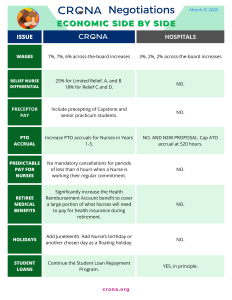
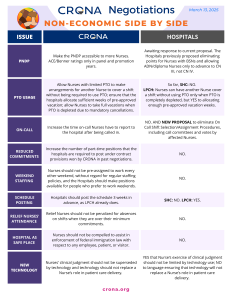
Upcoming Events – It’s Webinar Week!
March Webinars: Our next monthly CRONA membership webinar is set for tomorrow on Wednesday March 12 at 8 pm. We’re excited to see you there – bring your questions, and stay tuned to hear the latest updates from us. We will also be having a second webinar this month on Wednesday, March 26 at 8 pm ahead of the expiration of our current contracts on March 31. Be sure to attend both webinars!
Login information for tomorrow’s webinar will be sent via email Wednesday morning and via text Wednesday afternoon.
Donuts and Coffee Event: On Monday, March 17, come celebrate St. Patrick’s Day with donuts and coffee for CRONA Nurses.
💙💪 CRONA @Negotiations: Retiree Medical Benefits & Questions from You March 5, 2025
Dear CRONA Nurses,
Today, we wrapped up our seventh week of contract negotiations with SHC and LPCH. This week, we presented our latest proposal on the PDNP and worked through other important issues. Your negotiations team is hard at work fighting for the strongest possible contracts.
While we wait for the hospitals to respond to our economic proposals, we want to spotlight Retiree Medical Benefits. We also answer some of the great questions we’ve received from Nurses and provide an updated Side-by-Side.
This Week’s Spotlight: Group D Medical Retirement Benefits
Nurses who devote decades of service to the hospitals should be able to afford medical care when they retire. But the sad fact is that the hospitals’ retiree medical benefits do not come close to giving Nurses the security we deserve in retirement.
This is particularly true if we retire before age 65, when we become Medicare-eligible. We have Nurses who started their careers in their 20’s and, after decades of working on their feet, are ready to retire by 60!
What You Can Expect to Pay in Retirement
Health care costs are only going up, but here is what a recent Stanford flyer shows as the costs retirees can expect to pay. (This is for “Group D,” which applies to almost all CRONA-represented Nurses.)
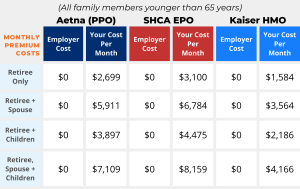
Medicare Supplement
Here are the numbers for the Kaiser Senior Advantage plan currently offered by the hospitals for supplemental Medicare insurance:
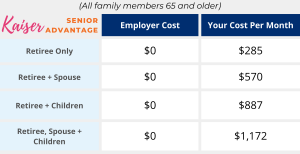
What Do the Hospitals’ Retiree Medical Benefits Currently Cover?
Almost all benefit-eligible Nurses are in what is called “Group D.” The Group D benefit is a Health Reimbursement Account (HRA), and Nurses receive an amount in the HRA that is based on their age and years of service at the hospital.
CRONA analyzed these amounts and compared them to the costs described above. The picture is grim.
If we retire before 65 and were to use the HRA money to pay the monthly premiums identified above, the money could last less than a year. For those who retire after 65, the money lasts longer but is still not sufficient to provide security.
Here are some examples of how long the current Group D benefit would last:
A Nurse with 20 years of experience who retires at 60: The Group D benefit ($21,705) would last just 8 months if a Nurse maintained Aetna coverage for themselves only.
A Nurse with 25 years of experience who retires at 64: The Group D benefit ($45,581) would last just 4 years and 7 months if a Nurse maintained Aetna coverage for themselves only and then purchased Kaiser Senior Advantage at 65.
A Nurse with 30 years of experience who retires at 55: The Group D benefit ($54,264) would last just 1 year and 8 months if a Nurse maintained Aetna coverage for themselves only.
A Nurse with 30 years of experience who retires at 65: The Group D benefit ($63,876) would last just 13 years and 4 months if a Nurse purchased the Kaiser Senior Advantage plan for themselves only.
How Can We Make the Retiree Medical Benefits Better?
CRONA has proposed that the Group D benefit be based solely on years of service.
In addition to tying retiree medical benefits solely to years of service, CRONA has proposed significant across-the-board increases to the size of the Group D benefit. CRONA’s proposal would improve Nurses’ security in retirement by ensuring that the Group D HRA is sufficient to cover at least a large portion of Nurses’ monthly premiums.

You Asked, CRONA Answers!
Q: I didn’t realize how out of line we are with other hospitals’ Relief Nurse differentials. Are we really so far below other hospitals?
A: Yes, our non-benefited Relief Nurses receive only $10/hour on top of the base wage rate. That is just 7.8% to 11.2% of their base wage rate, depending on the Nurse’s step and classification (CN II, III, or IV). Per diem Nurses at UCSF and Kaiser receive a 25% differential.
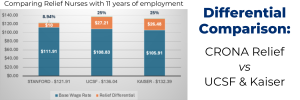
Q: I’m glad we’ve moved to economics, but I’m also concerned about some of the non-economic proposals that really affect my ability to stay in this profession. I saw that CRONA proposed that we wouldn’t have to use PTO when we arrange coverage for a shift. Why are the hospitals opposing that proposal?
A: We agree that nursing should be a sustainable profession! CRONA made a common-sense proposal that, when we arrange for a co-worker to cover our shift, we should not have to use PTO for that shift if we have less than 108 hours, or nine 12-hour shifts, of PTO. This proposal benefits the hospitals because it creates incentives for Nurses to arrange coverage. The hospitals have rejected the proposal three times, with no good reason.
Your CRONA team is committed to bringing your stories to the table, so if this proposal would make a difference to you, please continue to write to us! Use the link below to send us an email.
March 31 Countdown: Are We Going on Strike?
With the March 31 contract deadline approaching, a lot of Nurses have asked if/when we are planning to go on strike. Let’s be clear: going on strike is always a last resort. We never plan to go on strike. But March will be a busy month and we will continue to share updates. Please be sure to keep an eye on your email and our social media @cronanurses for further updates as we approach the end of the month.
CRONA is committed to transparency and to making sure all Nurses are well informed. We know that an educated Nurse is an empowered Nurse!
Please feel free to use the email button to ask us questions or let us know what you’re thinking. We want to know!
Upcoming Events
March Webinars: Our next monthly CRONA membership webinar is set for next Wednesday, March 12 at 8 pm. We will also be having a second March webinar on Wednesday, March 26 (shortly before the expiration of our current contracts). These webinars are an opportunity to hear the latest updates, ask questions, and hear from other Nurses about the issues they face in their workplace. Be sure to tune in!
Donuts and Coffee Event: On Monday, March 17, come celebrate St. Patrick’s Day with donuts and coffee for CRONA Nurses.
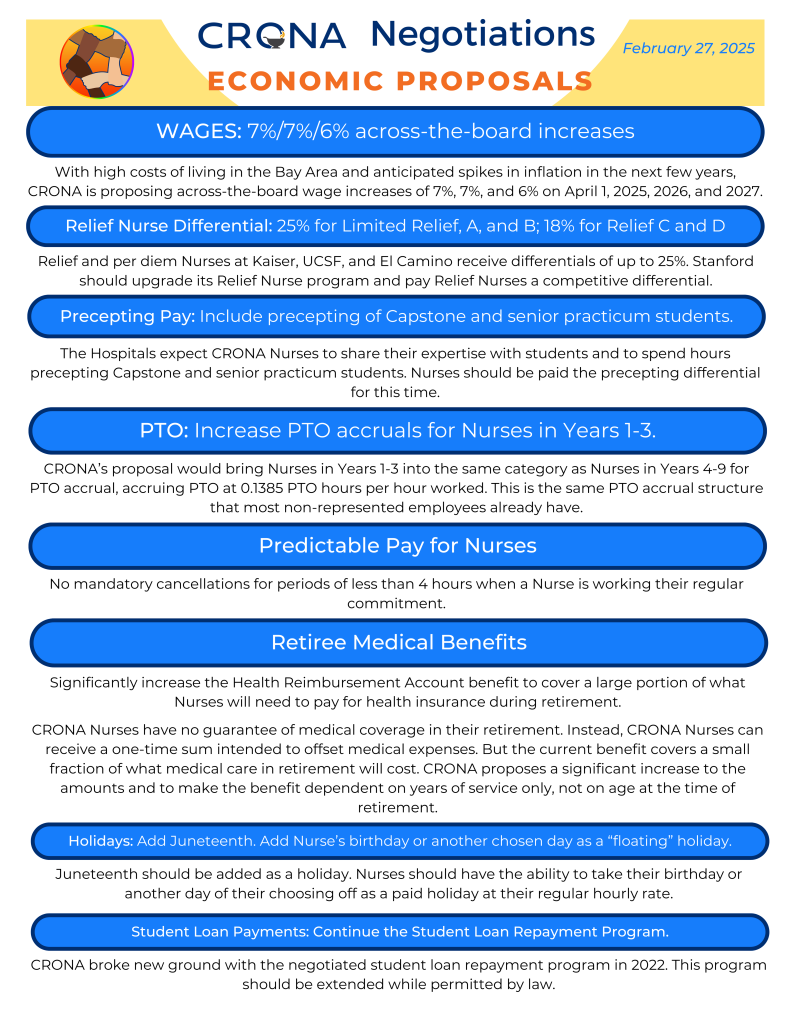
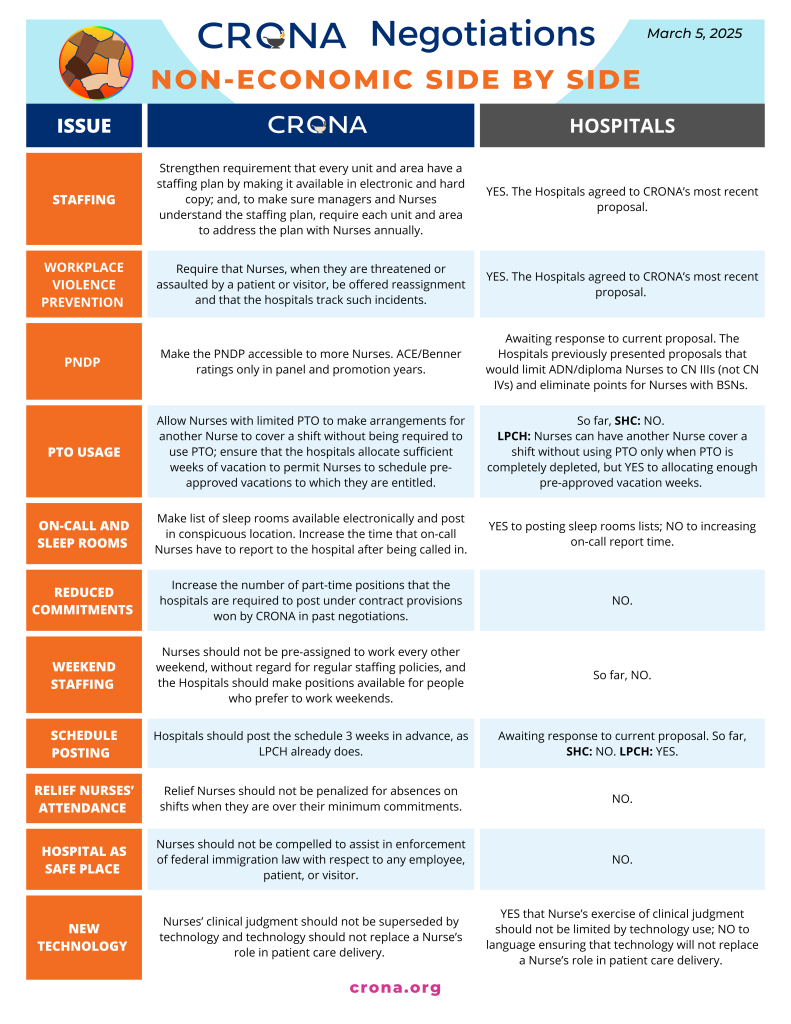
💙💪CRONA @Negotiations: What We’re Fighting For! February 13, 2025
Dear CRONA Nurses,
CRONA has been bargaining with the hospitals for the last four weeks. The focus these past weeks has been on “non-economic” issues. The parties will soon be moving to economic issues, including wages and benefits. Here is a round-up of some of the top non-economic issues:
Sad News About CRONA’s Founder and First President
Today, we lost a valued member of our CRONA family. …It is with deep sorrow that CRONA announces the passing of our founder and first president, Marion Mullin. Marion was a true pioneer who dedicated her life to advocating for fair wages and improved working conditions for nurses. Through her tireless efforts and unshakable commitment, she shaped the future of the nursing labor movement. Marion’s legacy will endure, both within the walls of the hospital and across the entire nursing community, and we honor the incredible vision, leadership, and compassion she demonstrated throughout her life. Marion’s unwavering dedication to the nursing profession and CRONA will never be forgotten.
We were privileged to interview Marion in 2022 for a short video about the founding of CRONA. Watch the video to hear what Marion and Stanford nurses were up against when they organized CRONA. To hear CRONA’s origin story is to be inspired about nursing and about advocacy.
Connecting with YOU! – Upcoming Events
We are here to answer your questions! Thank you to everyone who attended our webinar last night, where we shared the latest updates on negotiations and addressed Nurses’ questions. Our next webinar is set for March 12.
Tomorrow is Valentine’s Day, so we’re showing our love for CRONA Nurses. We show up every day, provide the highest quality of care for our patients and always have each other’s backs. We 💙 CRONA Nurses!
On March 17, we’ll mark St. Patrick’s Day with donuts and coffee for CRONA Nurses. Be sure to come say hello and bring any questions you may have about contract negotiations.
💙💪CRONA @Negotiations: reduced commitments, safe staffing, rotating shifts, workplace violence, & more! February 5, 2025
Dear CRONA Nurses,
This week, our CRONA Negotiation Team met with Stanford management three times to continue advocating for strong contracts that Nurses deserve. We focused on bringing Nurses’ experience and expertise into the room to inform how the contracts affect us and our patient care.
In our sessions this week, we pushed for proposals that would make a real difference for Nurses, including:
- The right of Nurses who are threatened or assaulted at work to be offered a reassignment.
- Increasing access to part-time positions at both hospitals.
- Protecting Nurses’ right to take pre-scheduled vacations when their PTO banks are depleted due to mandatory cancellations.
- Ensuring the hospitals comply with the safe staffing protections CRONA achieved in the last round of negotiations.
- Protections against unreasonable on-call report times.
- Limitations on the hospitals’ ability to force Nurses to “rotate” between day and night shifts with little notice.
Workplace Violence in the Spotlight. In the last two rounds of contract negotiations, CRONA has pushed for increased protections against workplace violence. CRONA Nurses took a stand against the much-too-common assumption that some level of workplace violence is acceptable. In 2019, CRONA won protections for Nurses who are threatened and assaulted at work, allowing those Nurses to request reassignments. This year, CRONA is pushing to require the hospitals to affirmatively offer reassignments. After an assault, Nurses may be traumatized and not in a position to advocate for themselves.
As one of the workplace violence prevention resources recommended by the Joint Commission points out: “There is a long-standing belief in health care that verbal abuse ‘comes with the territory.’ Although incidents of verbal/physical violence or abuse may occur in the workplace, that does not mean that it should be tolerated by staff.”
CRONA is working hard to shed a light on the verbal and physical abuse that Nurses frequently experience and hopes managers will partner with Nurses on this by making appropriate reassignments and reporting the abuse.
Nurses’ Experiences Matter. At the negotiating table this week, we also shared anonymized stories from Nurses who wrote CRONA about the importance of part-time positions and provided a detailed analysis of why our proposal to increase the availability of part-time positions was feasible. The response to CRONA’s request that Nurses share their experiences with part-time positions was overwhelming. Here are just a few examples of what your team shared with Stanford management:
“I have seen many great nurses leave because they needed a lower commitment to pursue goals like going back to school, traveling or starting a family.”
“I would love the option of reducing my commitment, because I know with my commute and growing our family it would be impossible to keep working full-time at LPCH. … With my seniority I will probably have to wait 10 or more years to be able to go part-time. This discouraging reality has resulted in me looking elsewhere for a part-time position. I know I am not alone, there’s so many nurses starting families or growing their families that would love the option to reduc[e] their commitment!”
“I was able to decrease my commitment after 17 years to 0.6, and I now truly believe I’ll have longevity in my career at the bedside.”
“When I got pregnant with my first child, I hoped for a 0.75 FTE – that was 5 years ago. I’m a full time nurse, and the thought of working just one less shift per pay period would be a dream. But knowing that I’m going to have to wait at least another 10 years (realistically) for a reduced commitment position is pretty defeating.”
“I really wanted a part time when I had kids but wasn’t able to, now almost 20 years later my kids are older and don’t need me as much but that means I’m older and still in need of a part time job! I know it’s on the horizon for me. I only have to wait for 1 or maybe 2 more nurses to retire. I see the younger generation going through the same thing I did when I started, hoping… wishing… for a part time. They see me and realize, if I don’t have one yet that means for them it’s unattainable, and therefore these awesome nurses are going to leave!
With strength in numbers and the unity of our voices, we can make positive changes in our workplace. Please continue to share your stories so we can make sure Stanford Health is hearing from the Nurses who keep its hospitals running. Your perspective matters!
Have you had issues with PTO? Could PTO be more flexible?
How does the ability to use your PTO impact the sustainability of your nursing career? Have you ever had to give up part of a pre-approved vacation because your PTO ran short? If so, what contributed to your PTO balance running short – illness for you and/or your family, frequent cancellations, using PTO when someone picks up your shift, LOA, or…? What other factors contribute to PTO issues?
Let us know!
Your CRONA Negotiation Team wants to know how Nurses are affected by current rules about the use of PTO at the hospitals. Please drop us a line by clicking the button below to let us know your experiences and thoughts – we look forward to hearing from you!
[see the newsletter in your email for link]
Second Wednesday Webinar
Here’s a reminder about our monthly membership webinar, coming up in February. Hear from CRONA leaders about current issues, now including contract negotiations, and have the opportunity to both ask your own questions and hear the questions asked by other nurses.
Wednesday, February 12
8:00 – 10:00 PM
The login information for the webinar will be sent on the day of the webinar by email and text. See you next month!
💙💪6000+ Nurses Standing Together! January 30, 2025
Dear CRONA Nurses,
Our CRONA Negotiation Team met with Stanford Health Care and Stanford Children’s management three times this week to continue pushing for strong contracts that will make nursing more sustainable, improve working conditions, and ensure adequate workplace protections, support Nurses’ need for sustainable careers and ensure protects and builds upon our workplace protections. In this week’s sessions, we advocated for:
- Improvements to the industry-leading safe staffing provisions we won in the last contract, including advocating for language to ensure that Nurses are allowed to provide feedback on staffing plans and have adequate information and education about those plans – which must take into account of patient acuity and the need to provide all Nurses with meal period and rest breaks.
- A new proposal intended to protect the trust between Nurses, patients, and their families by ensuring that no Nurse can be required to participate in enforcement of immigration law and the hospitals may not retaliate against Nurses who refuse to do so.
- Improvements to on-call requirements and access to sleep rooms.
- Humane and predictable schedules for Nurses designated as “Rotators.”
- Increased protections against workplace violence, including making it easier to exercise the the right to refuse a new patient assignment in the event of an assault or threat by a patient or patient’s visitor.
We also responded to the few non-economic proposals put forth by the hospitals. The hospitals have not yet responded to many of CRONA’s opening proposals, including proposals regarding PTO usage, Relief Nurse absences, increased opportunities for part-time positions, weekend staffing, education reimbursement procedures, and new technology.
You may have seen that Stanford is particularly highlighting their Workplace Violence counterproposal. We appreciate management’s acknowledgement that ensuring nurses’ safety is a key concern and for addressing this early on in our bargaining process. As mentioned above, we are still reviewing their counter to our original proposal.
When your CRONA negotiating team is at the table, our job is to give voice to the experiences of our more than 6,000 Nurses fighting together! We want to hear from you! We will ask for your thoughts and experiences on different topics – see below to share your story about part-time positions. When we are at the negotiating table, we are over 6000 nurses fighting together. Our unity is our strength, and it gives us the power we need to build a better hospitals.
What happens next? We will continue to meet with the hospitals three days a week until our current contract expires on March 31. Look out for our upcoming negotiations updates, come every for our We will continue to send regular updates regarding contract negotiations and hold to our monthly member webinars, and follow CRONA’ social media for other updates.
How do you feel about working part-time in nursing?
Is working in a reduced commitment something you are doing now, are waiting for, or hope to be able to do in the future? We want to hear from you! Why do you want a reduced commitment position? How long have you waited for a reduced commitment position to be available?
Let us know!
Your CRONA Negotiation Team wants to know how nurses are affected by the availability of part-time positions at the hospitals. Please drop us a line by clicking the button below to let us know your experiences and thoughts – we look forward to hearing from you!
[see the newsletter in your email for link]
Second Wednesday Webinar
Here’s a reminder about our monthly membership webinar, coming up in February. Hear from CRONA leaders about current issues, now including contract negotiations, and have the opportunity to both ask your own questions and hear the questions asked by other nurses.
Wednesday, February 12
8:00 – 10:00 PM
The login information for the webinar will be sent on the day of the webinar by email and text. See you next month!
💙Bargaining for Our New Contracts is Underway! January 26, 2025
Dear CRONA Nurses,
Thank you so much for turning out for our Negotiations Kick-off Event! It was great to see so many nurses having fun together and supporting one another. The event really showed the unity that makes CRONA strong. Now it’s time to get to work!
Starting Tuesday, your CRONA Negotiating Team will begin meeting with Stanford Health Care and Stanford Children’s management three days a week. Our goal is to win a strong contract that ensures we can continue to deliver the highest quality of care to our patients.
Your CRONA Negotiating Team is made up of CRONA Nurses, your coworkers from both hospitals, who we introduced to you last Friday and can be viewed on our website. The Team represents diverse areas of nursing practice, from ICU and ED, inpatient floors, oncology, surgery and procedural areas, to outpatient departments. The Negotiating Team is equally diverse in its geography: we have nurses from the Palo Alto campus and others from offsite locations across a variety of Bay Area cities; some live locally, and others have long commutes due to the high cost of living. This diversity is a key part of our strength.
In this week’s sessions, we expect the hospitals to respond to our opening proposals which centered on:
- Ensuring safe patient staffing throughout the hospital.
- Making nursing a sustainable profession, including by addressing scheduling, conditions for Nurses on-call, part-time positions, and more.
- Keeping Nurses safe in the workplace.
- Addressing emerging technologies like AI that can affect nursing practice.
- Holding the hospitals accountable and ensuring existing protections and benefits are secure.
What happens next? We will meet with the hospitals three days a week until our current contract expires on March 31. We will send regular updates regarding contract negotiations and will share opportunities for you to get involved. We will continue our monthly member webinars on the second Wednesday of each month, and hold additional online informational updates when we are further along in the negotiations process – so keep reading these updates and checking our social media for announcements!
Let’s Look At Weekends
Stanford 17.2.1/Children’s 16.2: “The Employer will use its best efforts to grant each full-time and part-time Regular Nurse at least every other weekend off.”
For nurses who work in units that staff the weekends similarly to weekdays – inpatient, Emergency Department, among others – have you ever asked your manager to look at allowing nurses to work less frequently than every other weekend? If so, how did that work out? Does working most weekends fit your lifestyle better because of school, child/family care or other reasons? Would improvements to weekend scheduling make you more likely to stay in your job?
Your CRONA Negotiation Team is looking at various ways to make nursing a more sustainable career, and that means looking at how to improve scheduling. Please drop us a line by clicking the button below to let us know about your scheduling needs related to weekends. In other newsletters we will ask more questions about your experiences – we look forward to hearing from you!
[see the newsletter in your email for link]
Second Wednesday Webinar
Here’s a reminder about our monthly membership webinar, coming up in February. Hear from CRONA leaders about current issues, now including contract negotiations, and have the opportunity to both ask your own questions and hear the questions asked by other nurses.
Wednesday, February 12
8:00 – 10:00 PM
The login information for the webinar will be sent on the day of the webinar by email and text. See you next month!
Meet the Team! 💙💪 January 24, 2025
Dear CRONA Nurses,
It’s almost time for our 2025 Negotiations Kickoff Event, where we will have fun and support each other as we get ready to negotiate our new contracts. The members of our Negotiation Team will be at the event, and I hope you will take the opportunity to say hello and inspire them with your support. We have a great team, drawn from both of our hospitals and from diverse areas of practice.
Next week, we return to the tough but rewarding work of bargaining as we move to meeting with the hospitals three days a week. Expect the pace of things to increase as we move forward, and make sure to read our eblasts and follow us on social media for the latest in news and updates.
See you on Sunday!
In Unity,
Colleen Borges
President, CRONA
How to know who gets a mandatory A-day?
In 2022, we added language to both hospital contracts to clarify scheduling. This was done in part to address the order of cancellation when Regular and Relief Nurses are working above their commitments. Here’s the language, from Stanford Section 18.4/Stanford Children’s Section 17.9:
“No later than July 10, 2022, the posted schedule shall reflect when a Nurse is scheduled to work over the Nurse’s minimum regular commitment.”
When the manager makes the schedule and schedules a nurse for more shifts than the nurse is required to work (which is only done if the nurse makes such a request), the manager is required to designate which of those scheduled shifts are the “over commitment” shift(s). This makes things simple when the unit is over staffed and there are no volunteers to take voluntary Absent time. The order of cancellation is to cancel a Relief Nurse working above commitment, then a Regular Nurse working above commitment. Knowing which shifts are the “over commitment” shifts makes this simple. Absent this information, it can be confusing to determine order of cancellation. This information must be included on the published schedule at time time of publication.
If your manager is not designating over commitment shifts on your unit’s schedule, please email the manager to request that this is done in the future, and please Cc crona@crona.org on the email so we know where the contract is not being followed.
Our current contracts are available in searchable PDF form on the Resources page of the crona.org website.
Bargaining for Our New Contracts is Underway! 💙💪 January 15, 2025
Dear CRONA Nurses,
Your CRONA Negotiating Team has been hard at work. Today, CRONA presented a package of opening non-economic proposals to Stanford and Stanford Children’s management.
CRONA’s proposals reflect the priorities of Nurses – raised in your responses to the negotiations survey, in our Wednesday Webinars, and in conversation with each other.
CRONA is working to:
- Ensure safe patient staffing throughout the hospital.
- Make nursing a sustainable profession, including by addressing scheduling, conditions for Nurses on-call, part-time positions, and more.
- Keep Nurses safe in the workplace.
- Address emerging technologies like AI that can affect nursing practice.
- Hold the hospitals accountable and make sure existing protections and benefits are secure.
CRONA presented detailed proposals on all of these items, as well as on the Professional Nurse Development Program (PNDP).
The hospitals had only a few opening non-economic proposals, primarily focused on existing notification procedures.
What happens next? Beginning Tuesday, January 28, we will be meeting with the hospitals three days a week until the contracts expire at the end of March. When we next meet, CRONA expects the hospitals to respond to CRONA’s opening proposals.
Join CRONA Nurses at our Negotiations Kickoff Event!
What better way to have an opportunity to join with nurses from our diverse nursing practice areas than to have a celebration!? Join your fellow CRONA Nurses for an evening of fun, food, and camaraderie for nurses. We’ll have complementary food and coffee/soft drinks, with wine/beer/signature drinks available for purchase. We also have new CRONA swag items plus our special merch store on site. Best of all, there will be lots of CRONA Nurses – including our 2025 Negotiation Team!
We ask that you RSVP if you plan to attend so we may plan for food – we want to make sure everyone has enough to eat! Get your CRONA Nurse friends and coworkers together and come to the party as a group!
Post our Kickoff Event flyer to your unit’s CRONA board by downloading and printing it! See below for an image of the flyer and link to a printable PDF.
This event is an in-person event for CRONA Nurses only. You are invited to enjoy complementary food at the restaurant however to-go boxes will not be available.
CRONA Scholarship
Congratulations to the recipients of the 2024 CRONA Scholarship! CRONA continues to strive to support nurses in their work and the development of the nursing profession. Each year CRONA awards educational scholarships of $1000 each to help defray the cost of continuing studies in nursing or a related field at the Bachelor’s, Master’s, or Doctorate level.
The 2025 scholarship application period will be announced in December. Many nurses applied for the scholarship. It is wonderful to know that so many nurses are working to further their education.
First day of Negotiations 💙💪 January 14, 2025
Dear CRONA Nurses,
All CRONA Nurses, together in unity, are the heart of our union. Our contracts provide structure that supports us in our work and shapes our lives. Now, we begin negotiating the agreements that will carry us forward to our future. Our current contracts expire on March 31, 2025, and the Negotiation Team is hard at work.
The theme of our 2025 negotiations is “Diversity is our strength, Unity is our power”. Nurses are diverse in our areas of practice, and in our personal and professional backgrounds. As a labor union, our diverse voices are united and strong, giving us power to speak loud enough to be heard and respected. It is the power we have when we unite, that as individuals we do not have alone. That strength and powerful voice help us come together in support of each other and our profession, with the shared goal of making nursing a sustainable profession that is the heart of patient care.
Expect to receive more frequent updates as we move forward into negotiations. We will introduce our Negotiation Team – made up of CRONA Nurses who work in areas throughout both hospitals and who have stepped up to represent all of us at the bargaining table. We will share updates regarding our proposals after we present them to the hospitals at the bargaining table. We will ask for your engagement and support. We will ask you to share your stories. We will have events where you can gather and enjoy the company of your fellow CRONA Nurses as we all work together.
In Unity,
Colleen Borges
President, CRONA
Join CRONA Nurses at our Negotiations Kickoff Event!
What better way to have an opportunity to join with nurses from our diverse nursing practice areas than to have a celebration!? Join your fellow CRONA Nurses for an evening of fun, food, and camaraderie for nurses. We’ll have complementary food and coffee/soft drinks, with wine/beer/signature drinks available for purchase. We also have new CRONA swag items plus our special merch store on site. Best of all, there will be lots of CRONA Nurses – including our 2025 Negotiation Team!
We ask that you RSVP if you plan to attend so we may plan for food – we want to make sure everyone has enough to eat! Get your CRONA Nurse friends and coworkers together and come to the party as a group!
Sunday, January 26, 2025
5:00 – 9:00 PM
Domenico Winery + Osteria
1697 Industrial Blvd, San Carlos, CA
Post our Kickoff Event flyer to your unit’s CRONA board by downloading and printing it! See the bottom of this newsletter for an image of the flyer and link to a printable PDF.
This event is an in-person event for CRONA Nurses only. You are invited to enjoy complementary food at the restaurant however to-go boxes will not be available.
CRONA and AFL-CIO Labor Councils
Today marks a historic step in the growth of CRONA Nurses. In the culmination of a process in the works for many months, CRONA is now affiliated with the South Bay Labor Council and San Mateo County Labor Council. Our first delegates were sworn in last night!
Labor councils are a confederation of many unions representing workers from multiple disciplines across the Bay Area. By participating with these councils, we demonstrate a collective commitment to our shared values and objectives, strengthening our bargaining position moving into this next round of negotiations. CRONA is looking for members who wish to serve as delegates for each of these labor councils. Meeting dates/times are listed below– If you want to join, please fill out a consent to serve form at CRONA.org. For any questions, please reach out to CRONA Legislative Representative, Meredith Holder—MHolder@crona.org
San Mateo Labor Council
1701 Leslie Street
San Mateo, CA
Meetings are at 6 p.m. on the 2nd Monday of every month
South Bay Labor Council
2302 Zanker Road
San Jose, CA
Meetings are at 6 p.m. on the 3rd Monday of every month (unless there is a holiday)
Side by Side Comparison
CRONA’s proposals stacked against hospital proposals
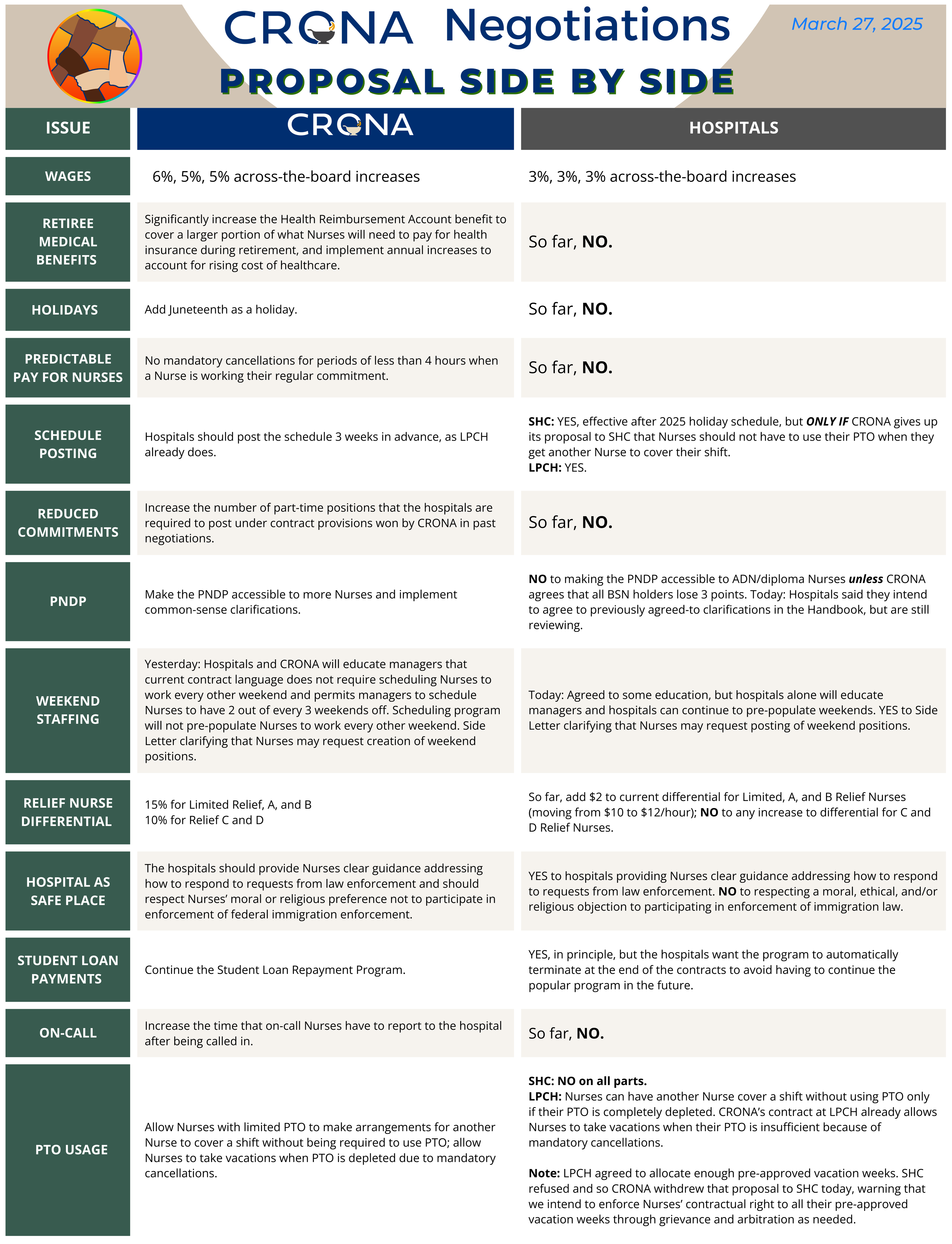
Retirement Medical Calculation Worksheet
Our retirement medical worksheet may help you plan for the cost of medical insurance in retirement. The insurance plans listed on the worksheet are those currently offered by Stanford Health Care and Stanford Children’s to their retired employees and the monthly cost of these benefits. This information is correct as of March 2025. Click HERE for a printer-friendly PDF version of the worksheet.
WHO WE ARE
CRONA’s 2025 Negotiations Team
Brittaney West, RN
Stanford Health Care; ICU M4 Medical

Nursing Experience: Originally from Buffalo, NY (Go Bills), Brittaney has 11 years of nursing experience, starting with Stanford in 2018. She worked in the PACU at Stanford and moved to M4 ICU, which was the COVID ICU, in the early months of COVID. The 2022 contract negotiations ignited her passion for labor union activism and she took on her current role as a CRONA Associate Nurse Advocate in fall 2022.
Fred Taleghani, RN
Stanford Children’s; Medical Transport Critical Care

Nursing Experience: 28 years in nursing, including 22 years at Stanford Children’s. Experience in pediatric ICU, neonatal ICU, and CVICU critical care transport.
Kathy Stormberg, RN
Stanford Health Care; Imaging Services
CRONA Vice President

Nursing Experience: 27 years in nursing, including 21 years at Stanford Health Care in medical/surgical/neuro ICU, PACU and SAU (Surgery Admission Unit), and outpatient radiology nursing. Other nursing experience includes United States Army Nurse Corps; inpatient med/surg/ortho, PACU, inpatient float pool, labor & delivery, unit manager.
Brittany Stombaugh, RN
Stanford Health Care; 500P Pre and Post Anesthesia Care Unit

Nursing Experience: Brittany started as a new grad in the Emergency Department 10 years ago, and has been with Stanford for 3 years, working in the 500P Pre-Post/PACU.
Kasia Smusz, RN
Stanford Health Care; ICU J2 Cardiothoracic Surgery

Nursing Experience: Kasia’s background is geographically diverse – from Canada to the East Coast and now at Stanford for almost 6 years. Her experience spans both bedside nursing in Acuity Adaptable Unit (AAU) and now in the Cardiovascular ICU, providing me with a unique perspective on the challenges of both floor and ICU nursing.
She knows that as nurses, we often prioritize the needs of others above our own. Negotiations are an opportunity to advocate for ourselves and ensure we have the resources, support, and compensation we deserve. It’s a chance to prioritize our well-being and ensure we can continue to provide the highest quality of care to our patients.
Kasia feels deeply honored and humbled to represent over 6000 nurses on the CRONA Negotiation Team.
Stacy Rusterholtz, RN
Stanford Children’s; Bass Center

Nursing Experience: Stacy has been a nurse for the last 30 years on the Pediatric Oncology and Stem Cell Transplant Unit here at Stanford Children’s. Her dedication to the union is driven by her belief in fair working conditions, better resources, and the protection of nurses’ rights.
Eileen Pachkofsky, RN
Stanford Children’s; Bass Center
CRONA Vice President

Nursing Experience: Eileen started her nursing career 19 years ago as a new grad at Stanford Children’s. She currently works on the hematology, oncology, and stem cell transplant unit. She has served three terms as CRONA VP for Stanford Children’s, and this is her third negotiations. She is a strong advocate and passionately fights for a fair contract. She is honored to represent her fellow nurses and excited to be a part of this team.
John McGowan, RN
Stanford Children’s; Pediatric ICU

Nursing Experience: John started his nursing career 12 years ago on a general telemetry floor. One year later he moved to adult ICU and worked in adult critical care for the next several years, including 4 years as a travel nurse. He moved to Pediatric ICU 6 years ago when he started at Stanford Children’s. He is passionate about fighting to better the profession of nursing for years to come.
Amy Krehbiel, RN
Stanford Children’s; Neonatal Intensive Care Unit

Nursing Experience: Amy is a Stanford Children’s NICU nurse of 25 years. She served on many of the past negotiation teams since 2010 and honored to once again represent all CRONA nurses for these contract negotiations.
Ash Goodson, RN
Stanford Health Care; Adult Emergency Services

Nursing Experience: Ash has been an Adult ED nurse at Stanford for 11 years, serving as CRONA Area Representative for the past 6 years, and represented CRONA on the Workplace Violence Committee for the last 2 years. He is a Clinical Nurse IV and works closely with his unit’s Education Department to train and mentor new Trauma Nurses, in addition to instructing TNCC courses. This is his first time a a Negotiation Team member, and he feels it is a privilege to advocate for our CRONA members during negotiations, ensuring their voices are heard and their needs are addressed.
Christi Decena, RN
Stanford Health Care; Clinical Advice Services

Nursing Experience: Christi has over 20 years of nursing experience. An adult and pediatric critical care nurse before moving to California, she worked in Vascular Access at Stanford Children’s. She later moved to her current position Stanford, where she joined the CRONA Executive Board as a Nurse Advocate and continues to serve as an Associate Nurse Advocate. She is passionate about empowering nurses and advocating for contract improvements to support nurses.
Colleen Borges, RN
Stanford Children’s; Bass Center
CRONA President

Nursing Experience: 30 years in pediatric hematology, oncology, and stem cell transplant at LPCH. Outside LPCH she worked as a Pediatric Nurse Practitioner and lactation specialist in pediatric outpatient clinics. She has additional experience in pediatrics, postpartum, newborn nursery, and labor and delivery.
Shauna Bickham, RN
Stanford Children’s; Case Manager

Nursing Experience: Started her nursing career in adult subacute care. She earned her Master’s of Nursing in Case Management. Her Stanford Children’s career is entirely in Case Management, starting in the department prior to the Case Managers joining the CRONA bargaining unit.
Andrew Veitch, RN (Alternate)
Stanford Health Care; Operating Rooms – Ortho

Nursing Experience: Andrew has been a nurse for 30 years. He trained Cape Town, South Africa and worked as an ICU Nurse Practitioner and Trauma Resuscitation Nurse Clinician. He emigrated to California in 2003. Andrew’s Stanford career started 14 years ago, with 8 years as a Flight Nurse Specialist on the Life Flight helicopter and the last 5-6yrs as a Scrub Nurse and Circulator in the Neurosurgical Service line at 500P Operating Rooms.
Andrew is the CRONA Area Representative for Neurosurgery and this is his second round on the CRONA Negotiations Committee and first time participating in negotiations as a Negotiations Team alternate member. He feels a strong sense of doing what is right for nurses to ensure that nursing can remain a sustainable and meaningful career and this includes ensuring that applicable labor laws are followed to the letter and that nurses are protected through strong, comprehensive Collective Bargaining Agreements by professional nurse unions such as CRONA.
Chiyieko Sankus, RN (alternate)
Stanford Children’s; Bass Center Float Team

Nursing Experience: Chiyieko has dedicated her entire 18 years of nursing to Stanford Children’s and was a member of prior negotiation teams. She is passionate about improving working conditions for nurses and care conditions for patients. Her nursing experience includes oncology/hematology/stem cell transplant and oncology float team.
Erin Poh, RN (alternate)
Stanford Children’s; Labor & Delivery

Nursing Experience: Erin works the night shift in Labor and Delivery at Stanford Children’s, where she’s been for the last 15 years. Before that, she worked at UCSF in L&D as a patient care assistant and was also a doula while finishing up her MSN (perinatal CNS) and becoming a new grad nurse. Before that she also working in labor… just not labor and delivery. She was a union rep for the Media Workers for about 15 years. Erin likes to say that she always knew I wanted to work in labor, but just didn’t get the “and Delivery” part until a bit later in life! She feels very honored to work with the amazing folks on this team and is looking forward to jumping into negotiations to help improve our contract for all of us — and for the patients we serve.
TJ Carella (alternate)
Stanford Health Care; Cath Angio

Nursing Experience: TJ has been a nurse for over 22 years and has worked for Stanford for 14 of them. While at Stanford he has worked in the ED, cardio thoracic ICU, and currently works in the cath lab. Prior to Stanford he served as a combat medic in the US Army, worked in surrounding community hospitals, VA facilities, and county hospitals. Following our last contract negotiation, he has been eager to serve his unit as a CRONA Area Rep and has a passion for advocating for fair and consistent working conditions for fellow nurses. This is his first time serving on the negotiation team as an alternate and he is eager to help us further develop and protect our contract in the years to come.

